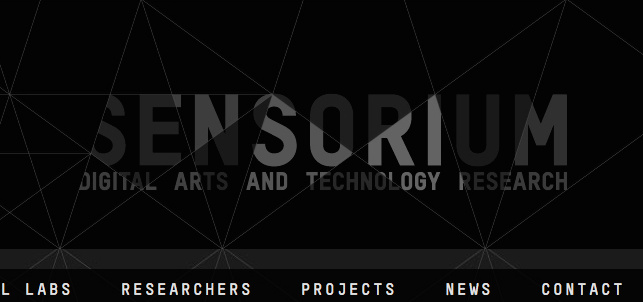A film prof at York U casts technology in a starring role with Sensorium lab
by Christine Wong — Apr 9 '14
by Christine Wong — Apr 9 '14

The Person: Dr. Janine Marchessault, film professor, co-founder of Future Cinema Lab and inaugural director of Sensorium, all at Toronto’s York University. She’s also director of the Visible City Project + Archive and past Canada Research Chair in art, digital media and globalization. She’s a teacher, author, editor, filmmaker, McLuhan scholar, exhibition curator, academic researcher and globetrotting speaker. In 2012 she won a $225,000 fellowship from the Pierre Elliott Trudeau Foundation.
Marchessault’s focus on art and technology runs far beyond the aesthetic and academic. “(It’s) about redefining places where art is shown, getting it out of galleries and museums and putting it in unusual places,” she says. Take Land/Slide, an exhibition she curated last year in the Toronto area suburb of Markham. By placing interactive, multimedia art installations within historic village buildings, the show riffed on themes of history, urban planning, cultural diversity, architecture and environmental sustainability.
The Project: In her ongoing Visible City Project, Marchessault examines how new media technologies and globalization influence artistic cultures in Toronto, Havana and Helsinki. In 2013, Marchessault helped launch Sensorium, a set of labs where academic research meets artistic expression and technological innovation. Part of its stated mandate is to focus on “collaborative methodologies between artists and scientists.” Case in point: Sensorium’s Future Cinema Lab, where researchers and artists explore new methods of digital storytelling via film, 3D technology, augmented reality (AR), mobile media and interactive Web content.
Sensorium is as much about technology creation as research generation. For Land/Slide, various AR apps were developed at Sensorium so people could use their mobile devices to enjoy an enhanced experience at the show. “That’s one of the research axes that Sensorium engages with: in situ, site specific technologies that exist in the environment and create new kinds of interaction between public spaces and technology,” says Marchessault.
The Progress: While Sensorium, Future Cinema Lab and Visible City are all ongoing long-term projects, Marchessault does have some new irons in the fire. She plans to transform a tiny schoolhouse museum in Toronto’s North York district into a public art installation using various display technologies to explore “the concept of progress.”
The Prospects: Though no commercial activities have come out of her research yet, Marchessault says some of the components developed for Land/Slide (in AR, architectural projection and embedded media) carry the most potential to become licensed intellectual property or be applied to existing products and services.
The Passion: Marchessault believes there’s a global crisis in ecological sustainability. She says digital technology can help engage people in environmental issues – and art in general – by making both seem more accessible and relatable.
“A lot of artists are using new kinds of media – whether it’s mobile phones or large projections or Internet-based artworks – to forge a new space where art can be a means of both creating this public conversation around relational forms of art or in developing new kinds of pedagogies,” she says. “It’s a whole new aspect of public space with all this digital technology. And a whole new concept of engagement.”
Christine Wong is a journalist based in Toronto who has covered a wide range of startups and technology issues. A former staff writer with ITBusiness.ca, she has also worked as a reporter for the Canadian Economic Press and in broadcast roles at SliceTV and the CBC.
Twitter LinkedIn Google+
Apr 17 '14

Apr 16 '14

Apr 15 '14

Apr 11 '14
Copyright © 2016 CommerceLab


